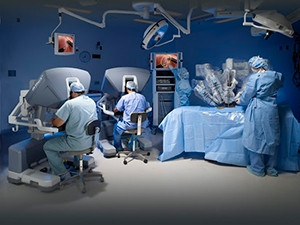
Robotic Surgeon Dr Hugo van der Merwe successfully conducted Africa's first robotic-assisted removal of a cancerous bladder (cystectomy) and prostate (cysto-prostatectomy) at the Urology Hospital in Pretoria this week.
According to the Urology Hospital, the surgery, the first of its kind in Africa, was conducted using the da Vinci Surgery Robotic system to reconstruct a new bladder (neobladder) from the patient's bowel, after removing the cancerous bladder and prostate in what is normally high morbidity surgery.
Dr Van der Merwe says the da Vinci Surgery Robotic system, a robotic surgeon with tiny lights, tiny cameras and steady robotic arms, has been previously used in SA to perform other medical procedures such as the removal of a prostate gland and a partial nephrectomy.
However, it had not until now been used for the removal of a cancerous bladder anywhere in Africa.
He explains traditionally this procedure was conducted using many surgical instruments and doctors would perform it without being able to see the vital surrounding body organs which are now visible via the da Vinci Surgery Robotic cameras.
"This would cause many complications such as accidental tissue damage which leads to excessive bleeding and the patient would be required to spend a long time in hospital while under close observation.
"However with the da Vinci Surgery we connect the robotic system to the patients' abdomen and the robotic arms are inserted to remove the bladder without damage to the tissue or surrounding organs," explains Van der Merwe.
He notes the success using the robotic system has been excellent as the patient had aggressive bladder cancer and needed standard post-operative chemotherapy: "The recovery is remarkable," he added.
He adds the 36-year-old patient now has perfect bladder control, is fully potent and enjoys normal bodily functions without the burden of a colostomy bag.
Van der Merwe reveals: "Standard surgical procedures are associated with very high morbidity [complication] rates. Even in the best medical centres in the world there is a 30% chance of secondary surgery within the first 30 days after operating as well as significant problem such as blood loss, pneumonia and embolism.
"The robotic system aids in significantly less morbidity and recovery time is much faster. We have not as yet had to take any patients back to theatre due to complications."
He points out in the past he has witnessed patients suffering severely following such medical procedures and doctors have had to create an external colostomy bag, which the patient would have to walk around with.
However through this technology, he says, doctors have been able to produce a new internal bladder using the bowel of the patient.
The Urology Hospital says doctors and patients have embraced this advanced technology, which is revolutionising the effectiveness of specialised surgery and the recovery process.
Share